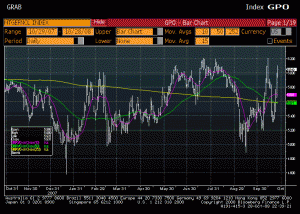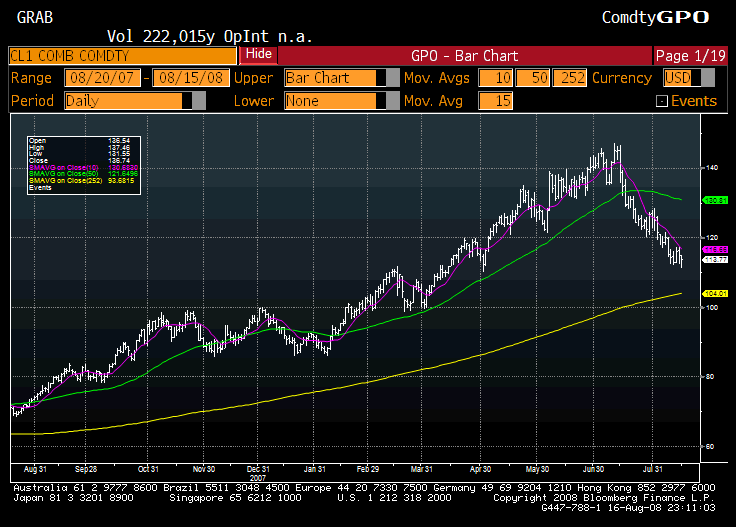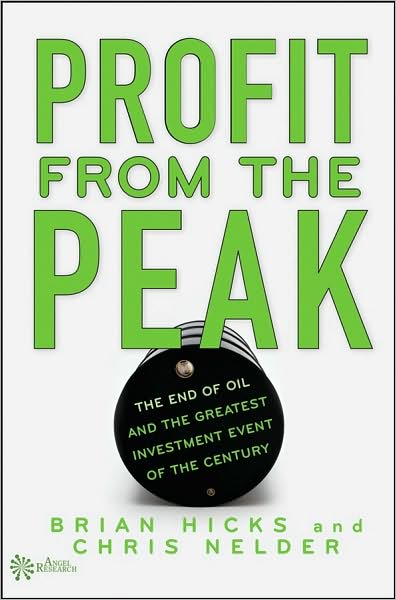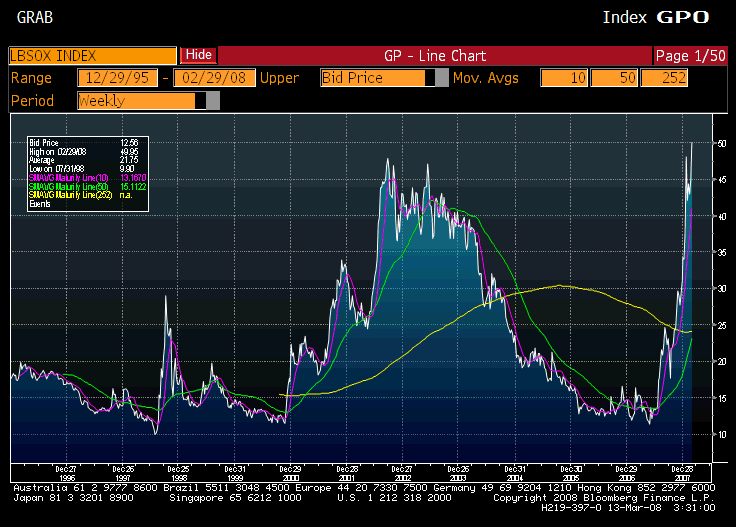Fifteen More Notes and Comments on the Current Crisis
1) Do Fannie and Freddie deserve some blame for the crisis that we now face? Yes, but not without blaming Congress and the Executive Branch for pushing homeownership far beyond the natural rate of ownership, which I wager is around 60% rather than the 72% that it touched for a brief time.
But here are some ways that F&F went out of their way to help create the current crisis:
- F&F did push loan growth and growth of their retained portfolios in order to benefit their shareholders.
- They bought significant amounts of Alt-A and other lower quality loans for their retained portfolio.
- They aggressively lobbied to protect their position.
- They argued for capital standards that were lower than would be needed in a crisis (so did many financial institutions)
- They lowered underwriting standards in order to meet competition from private lenders. They could have given up business, delevered, and been stronger companies for when the crisis would hit.
- They managed to their GAAP financials. A prudent financial institution manages to a stressed version of their most stringent capital constraint.
Finally, I would add that this was an area where Greenspan was right on policy, along with a few of the more conservative members of Congress. If you are going to have F&F at all, then use them contra-cyclically. When the mortgage markets are lending, F&F should sit on their hands, and let the market do its work. If F&F?s balance sheets weren?t impaired now, they could be doing some real good here, but because their credit quality is suspect, as well as the commitment to their solvency from the Federal Government, their cost of fresh capital is high, making mortgages more expensive than they otherwise would be.
Note the current rise in Fannie 30-year mortgage rates.? This series tends to peak out at 6.20% but I am expecting rates to exceed that and soon.
Personally, I don?t think the government should be in financial businesses. Government agencies tend to overlend, and lend to bad risks with insufficient compensation. Then again, I don?t think governments should be in the money business either; they abuse the privilege, stealing from us in the process.
2) Will contractual terms be honored by the courts? Some hedge funds will press for their rights. My guess is that they won?t win in this environment. The system has a tendency to fight individual rights in a crisis. But, there is no free lunch. To the extent that contractual rights are infringed, rates will rise when lending resumes to compensate for expropriation risk.
3) Get financing when you can, not when you have to. Others have pointed to this post, but it bears repeating.The banks ran for too long on capital bases that were too slender.Now they are paying the price.The only pseudo-equity capital available is that from government sources.
Now, there may be a competition for that capital from the government, and perversely, it might lead to banks using the capital to buy other institutions (PNC has already done it to Nat City), rather than make loans, and on net, I would expect that to result in still fewer loans being made than in the absence of a merger. So let the competition begin for who can gobble their cheap competitors with cheap government capital.
4) Away from that, the Fed is having a hard time controlling Fed funds since they started paying interest on reserves deposited at the Fed.
Though I have written on the changing balance sheet of the Fed [link] and its implications, Jim Hamilton of Econbrowser has a very good post on it as well. The only place where I think we differ is that I think this will eventually be inflationary to goods prices when the Fed is forced to stop sterilizing.
5) Now the Fed is in the business of short-term unsecured lending to corporations via buying CP. (I think this will help lead to the first real CP default since Penn Central.) Early indications are that CP funding costs are higher than before the crisis if CP is funded by the Fed.
6) Never buy something you don?t understand, unless you have a friend who is smart and trustworthy by your side to advise you. Many municipalities got bamboozled by investment banks in much the same way that homebuyers got swindled by those offering subprime loans. Through derivatives, they offered a way to lower the current costs of debt by having the municipality sell options against their position that would force costs higher under certain circumstances which seemed unlikely, but were more likely than not.
The same is true of many investment products created by Wall Street for retail investors.? Sell them something that offers a high yield with safety, subject to some options sold short that are unlikely to come into the money.? I see it often.? Don’t but complex structured products from your broker.? Odds are they are taking you for a ride.
7) Those who have read me for a long time know that I think GM and Ford are eventual zeroes for the equity, and the subordinated debt.? Even the senior debt will get whacked severely.? There is no value in corporations that have huge promises to their employees way out into the future, when competing against better capitalized and better run foreign competitors like Toyota and BMW.
So, don’t bother trying to rescue them.? Rather, let foreign competitors buy them out, if they want them.? That will be a good test as to whether there is value there or not.? Possible foreign buyers have worked under the assumption that the Big 3 cannot be bought.? If the US sends a message that they can be bought, would any of them be bought?? My answer is no, unless the US Government or the PBGC sweetens the pot.? Other notes:
- Daimler thinks Chrysler is a zero. (no surprise here)
- The Treasury should give up on lending to the automakers. (Much as other think they are critical.? If the plants are valuable, foreign capitalists will maintain them.)
- The TARP may lend to auto financing arms, but that is probably a mistake as well.
- We should not bail out the auto makers, regardless of how politically expedient is is.? Because of the employee benefit promises made, there is no way any US automaker can beat foreign competition.? It is time to let them fail, and let the unions take the rebuke that they royally deserve.
- GM is not too big to fail.? Let them fail, and then expedite the bankruptcy process, so that senior debt becomes equity, the firm goes non-union, and the firm can compete globally for the first time in 40 years.
8 ) Greg Mankiw asks if we have learned enough.? My view is no, we have learned little, and what Bernanke thinks he learned regarding the Great Depression is wrong.? This is not a crisis of confidence and liquidity, it is primarily a crisis of solvency, which drains liquidity.? High levels of total leverage make a financial system inherently unstable, and the only way to cure it is through expedited bankruptcy procedures.? As it is now, Bernanke and Paulson are trying to save the financial system by wagering the credit of the USA.? (My opinion is that our nation is great enough that we whould risk another Great Depression rather than give up our liberties to the Government.)
9) A young friend e-mailed me from LIthuania (where she has a semester abroad), and asked me how serious the current economic situation is.? My response:
To give you the quick summary, we may be headed into Great Depression 2.? Or, as I sometimes call it, the Not-so-great Depression.
A Depression is a severe recession where the solvency of the banks is compromised.? Debt levels of financial companies, consumers and our Government have gotten to levels where repayment of debts in full is difficult if not impossible.? The system is overleveraged, and funded by leveraged institutions that could fail if they aren’t paid back.? There is kind of a “domino effect” here, where failures can cascade.
That’s why the Government has stepped in, encouraging financial institutions to shift their debts over to the Government.? That will work for a while, but eventually parties will become reluctant to lend to our Government as it becomes a bottomless pit of promises.? Then inflation of the currency will begin.
This is an ugly situation, one that is the product of sloppy monetary policy, poor regulation of financial companies (for two decades), poor risk controls, overlending by government institutions, and a cultural failure where we borrowed too much and saved too little.
I wish I could be more chipper here, but this is ugly, and what the government is doing is not likely to solve the problems at hand.
10) Slow moves tend to persist, sharp moves tend to mean-revert.? Don’t put much confidence in today’s sharp move up.? Strong one-day upside moves are characteristic of bear markets.
11) My post last night neglected one item.? Stable value funds have more flexibility than many other financial entities.? Be wary if the credited rate drops a lot.? Better to withdraw funds in that scenario, because it implies that the market value of assets is significantly less than the book value.
12) Be ready for a surprise in the GDP data, as I highlighted last quarter.? The implicit deflator for Gross Domestic Product will be extra high in the third quarter because of the fall in energy prices.? Just as it pushed “real” GDP higher in the second quarter, it will exact its pound of flesh in the third quarter.
13) My pal Cody is red hot, and though he is less measured than I am, I agree with much of what he says.? We need to vote out Republicans and Democrats.? We need new options.? Personally, I think we need to radically change the Constitution, and move to have a parliment, where the head of state is the head of the majority party.? That will create government that is closer to the consensus.? Eliminate the Presidency — it is too dangerous of an institution.
As Cody put it today: 2. Real headline today: ?White House Encourages Money-Hoarding Banks to Start Lending? ? I thought profit-motive was what was supposed to encourage banks to lend. And only profits make stocks go up, so why would shareholders want the banks to start lending if the bankers don?t think it?ll be profitable?
I can’t agree more, and the Treasury is pushing on a string if they are trying to force the banks that they have financed to lend.
14) Commercial Real Estate is the shoe yet to fall, yet the CMBS market has anticipated much of the decline.? Are the Fed and Treasury ready for this?? They weren’t ready for residential housing declines.
15) The foolishness that exists today regarding the government buying stakes in financial companies has now transferred itself to policymakers who think the equity market is now cheap, so invest the Social Security surplus in the equity market.? Problems:
- We have always avoided Socialism like this in the past.
- How can a bureaucrat with no profit motive figure out whether out whether this is a good decision or not?? Or, how will the bureaucracy extract maximum value for the taxpayers?
- Is the market really cheap now, or, only seemingly so.? The time to invest is during a baby bust, not a baby boom as it is now.
As with so many of these decisions, the answer will only be clear in hindsight.





